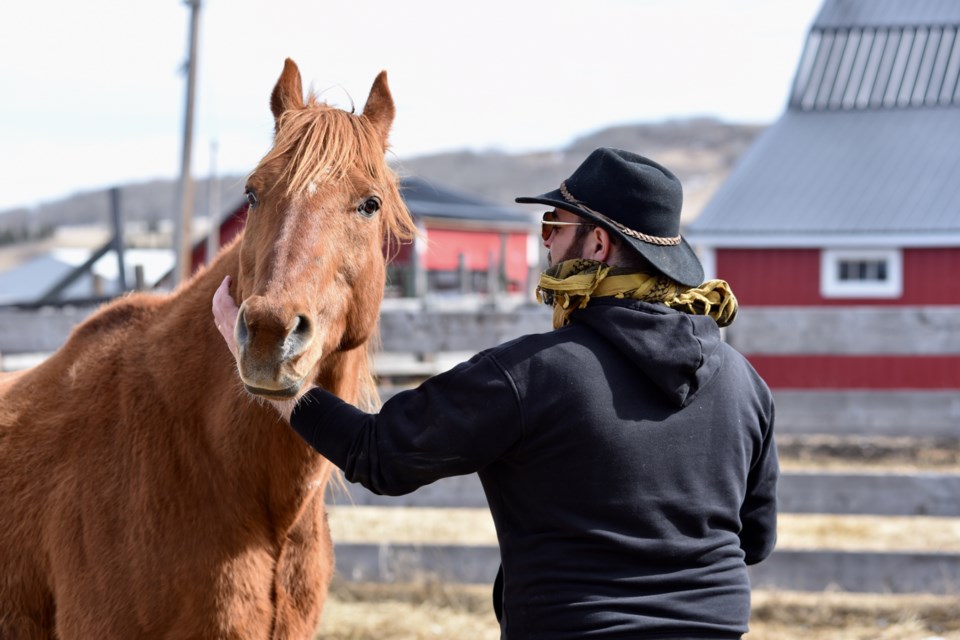COCHRANE— Wayfinders Wellness Retreat is continuing to expand its offerings and refine programming designed to support those on their post-traumatic healing journey.
The retreat recently hosted a slew of pilot programs last Saturday (March 27).
The day featured six facilitators introducing participants to sound healing, meditation breathing, warrior meditation, yoga nidra, art therapy and equine therapy.
Wayfinders co-founder and Calgary Police Services Det. Paul Wagman said it has been exciting providing a host of new programs for those healing from post-traumatic stress and operational stress injuries.
“Us doing this has been a guiding light in keeping people alive and safe,” Wagman said. “We’re starting to get that feedback on our social media and with our response and that feels incredible.”
Wayfinders has been learning and adapting to meet the needs of those who have experience post-traumatic stress. For example, Wagman said they have been expanding programming to run over two days or limiting activities taking place over one day.
An important aspect of Wayfinders is the peer-to-peer connections they can establish as it allows Wayfinders to share different and effective modes of healing between participants.
While there is “no magic potion” to healing post-traumatic stress injuries, Wayfinders provides the tools to help responders in their healing process.
A key aspect of their work has been providing strategies to understand the injury while de-stigmatizing and providing access to those who understand post-traumatic stress disorder from a professional or service perspective.
The pilot program on Saturday saw 10 people from across Alberta and Saskatchewan participate— All were linked by the experience of being first responders experiencing post-traumatic stress.
The goal of the day was to better understand the effectiveness of programs offered at Wayfinders in helping with different levels of injury, Wagman said.
“We wanted to choose people in the pilot programs that are from different areas so that in turn we can get feedback and we can maintain communication and those people will become our ambassadors,” Wagman said. “Those people are also people who have experienced trauma and have done something to progress their healing and need these outside-of-the-box sorts of programs.”
The equine therapy, led by Marilyn McLean, was one of the highlights of the day. Wagman worked with McLean to showcase the experience of equine therapy through a responder's perspective.
The equine therapy included three horses and started with establishing a heart connection with the horses and bonding with the animals through grooming.
“It was incredible,” Wagman said. “Everybody got a great deal out of that.”
After the equine therapy participants were able to engage in a fireside chat with Indigenous healer Darryl Auger.
Wagman added an additional benefit of the pilot program was connecting with first responders outside of the Calgary area.
“We’ve grown a massive community with people who have followed us across Canada,” Wagman said.
Wayfinders has been strategic in creating programs at the retreat and has focussed on having real tangible impacts on people who participate.
They are working to meet people where they are at in their healing journey and through their participation in programs are finding the best ways to help injured first responders.
Wagman said they have created a holistic selection of programs that have been influenced by their experiences and what has helped those recovering from post-traumatic stress injuries.
“We are always working to be current and responsive,” Wagman said.
Wayfinders are continuing to connect with people who can offer different forms of healing and have built a rich network of options to take care of those experiencing post-traumatic stress disorder.
The retreat helps people because they can support those in the early stage of post-traumatic stress disorder and give them hope that healing is available and they will not be permanently disabled.
“The model is one that can be applied to everyone, not just responders and military, and that’s what we hope to do too,” Wagman said.



